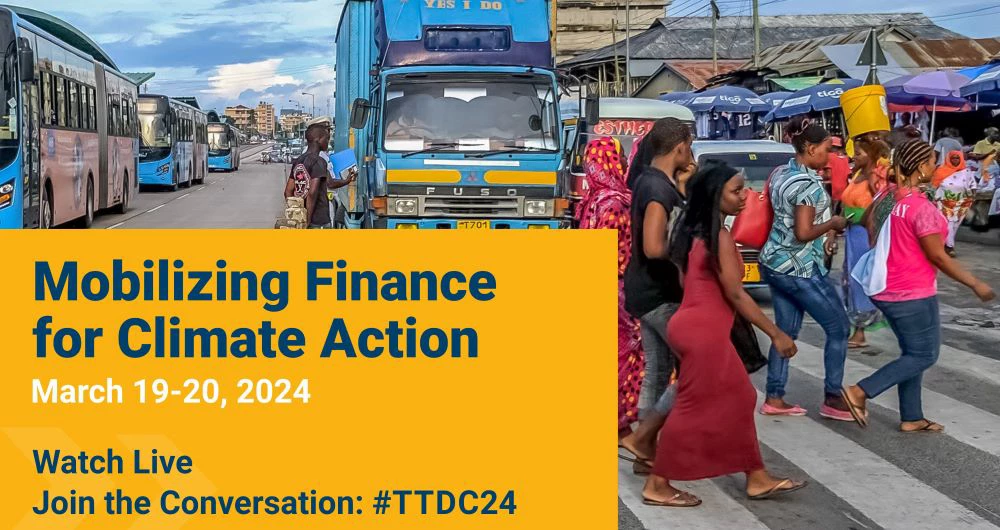 An image of pedestrians crossing a busy street.
An image of pedestrians crossing a busy street.
Attend Transforming Transportation 2024 Online
Transportation is a hot topic in the 21st century, touching on topics ranging from achieving net zero emissions to developing inclusive urban infrastructure. But developing inclusive, climate-friendly transportation is expensive. Government budgets are strapped, and in some cases, transport projects are perceived as risky investments that give the private sector pause.
We find ourselves caught between the pressing need for sustainable transport and the stark realities of fiscal constraints. So, how can we finance this essential transition?
This question lies at the heart of Transforming Transportation 2024, hosted jointly by the World Bank and the World Resources Institute Ross Center for Sustainable Cities. The conference, now in its 21st year, provides a forum for global leaders, policymakers, industry experts, and other stakeholders to explore the critical role of financing in the transition to low-carbon, resilient transport systems. Discussions will also cover logistics inclusion, gender, jobs, public health, and safety. The conference agenda provides greater detail.
The event will be held at the World Bank headquarters in Washington, DC, on March 19–20. In the spirit of inclusion, the entire two days of programming will be streamed online. Register in advance for a complete virtual experience, or tune in to World Bank Live for instant access to the opening sessions each day. The conference includes five plenary sessions, 17 parallel breakout sessions, networking events, and a knowledge exhibition where attendees can check out innovations such as Circuit (an on-demand electric shuttle) and Starship Technologies’ autonomous delivery robots. The plenaries will set the stage and frame the global conversation, while the parallel sessions will allow participants to dive deeper into specific areas.
Here’s what participants can expect:
Plenary sessions
-
Financing for low-carbon transport. A significant challenge is the funding gap for low-carbon transport solutions, especially in developing economies burdened by fiscal constraints and competing development priorities. The session will focus on leveraging private capital, de-risking investments, and ensuring progress in sustainable mobility.
-
Inclusion in mobility: The transport sector reflects broader societal inequalities, with marginalized communities such as women, the elderly, people with disabilities, and rural communities often struggling to access safe, affordable transport options. How can we best develop transport systems that provide access to jobs, education, healthcare, and other critical services?
-
Resilience of transport systems: Climate-related disasters, pandemics, conflicts, and other challenges increasingly threaten transport infrastructure and services. Developing resilient transport systems that can withstand, adapt to, and quickly recover from such shocks is crucial. This involves strategic planning, investing in durable infrastructure, and integrating climate adaptation and mitigation strategies into all stages of transport planning and operations.
-
Green logistics: The logistics sector—shipping, aviation, railway transport, and heavy-duty trucking—must both reduce its environmental footprint and meet rising global demand for freight transport. This session will explore how fuel-efficient technologies, sustainable practices, and innovative logistics management can make the supply chain more efficient, green, and resilient.
-
Ensuring a just transition in green mobility: As we shift away from fossil fuels, we must ensure a just transition for affected workers and communities. How do we address potential job losses in traditional sectors while creating new opportunities in sustainable transport? This session will tackle issues including governance, labor conditions, and equitable policies and practices.
High-level technical sessions
The 17 parallel breakout sessions address key issues and opportunities within the transport sector. These span a wide range of topics highlighting the diverse issues and innovations shaping the future of sustainable mobility. Topics include :
-
De-risking instruments to catalyze private sector-led adoption of electric transport, highlighting financial and regulatory strategies to encourage cleaner urban mobility.
-
Addressing gender disparities, ensuring women's equal participation and safety in transport systems.
-
Accelerating active mobility for non-motorized transport modes like walking and cycling to create healthier, more resilient cities.
-
Building transport systems that are accessible to all, including the most vulnerable populations, to enhance social equity and economic stability.
-
Using AI and data to support transport investments, showcasing how cutting-edge technologies can inform smarter, more efficient transport planning and operations.
Further sessions examine the role of climate financing institutions, the impacts of climate on transport in Latin America and the Caribbean, climate-smart public-private partnerships, and more. These sessions pave the way for innovative solutions that will shape the future of transportation, making it more sustainable, inclusive, and resilient.
Join us!
Join leaders, professionals, and enthusiasts from around the world in this critical conversation in-person or online. We have a record number of transport ministers joining, in addition to experts from academia and the private sector. Whether you are a policymaker, a CEO, a researcher, a student, or an advocate for sustainable mobility, your participation will help drive transformative change towards greener, safer, and more resilient transport solutions for all.


Join the Conversation